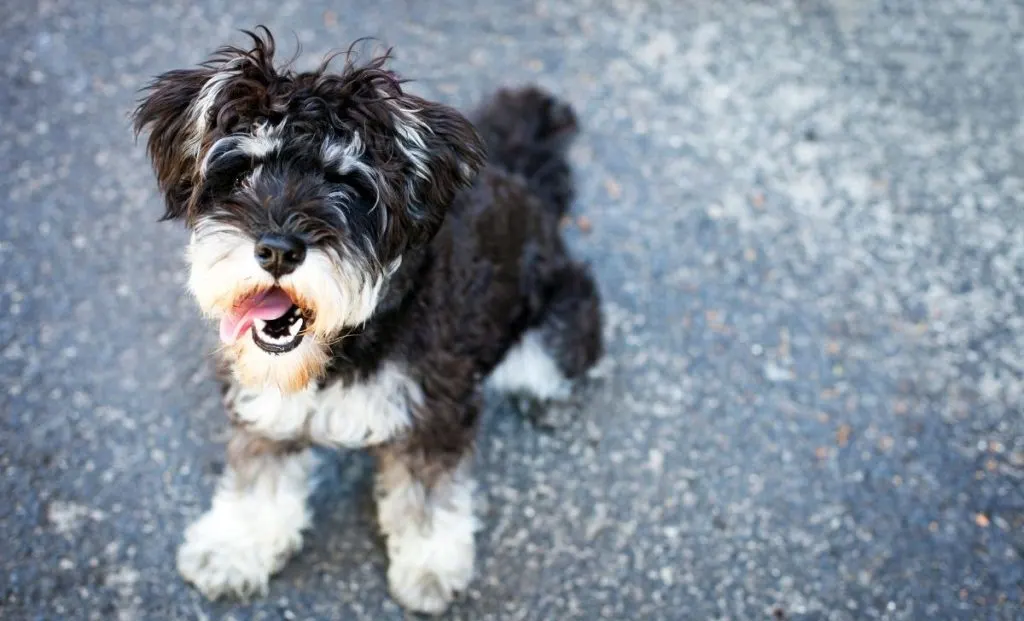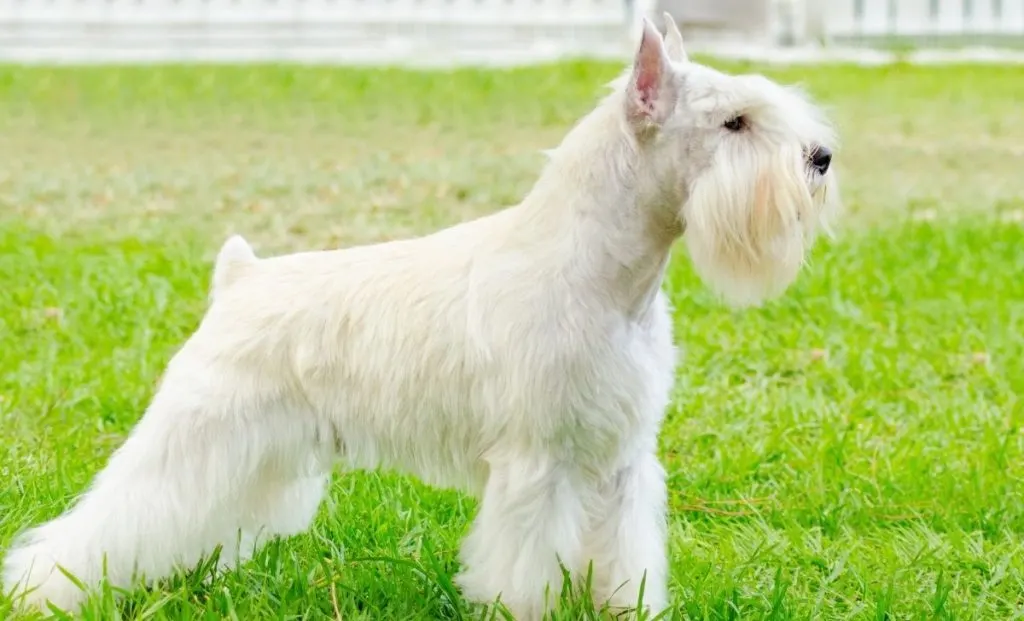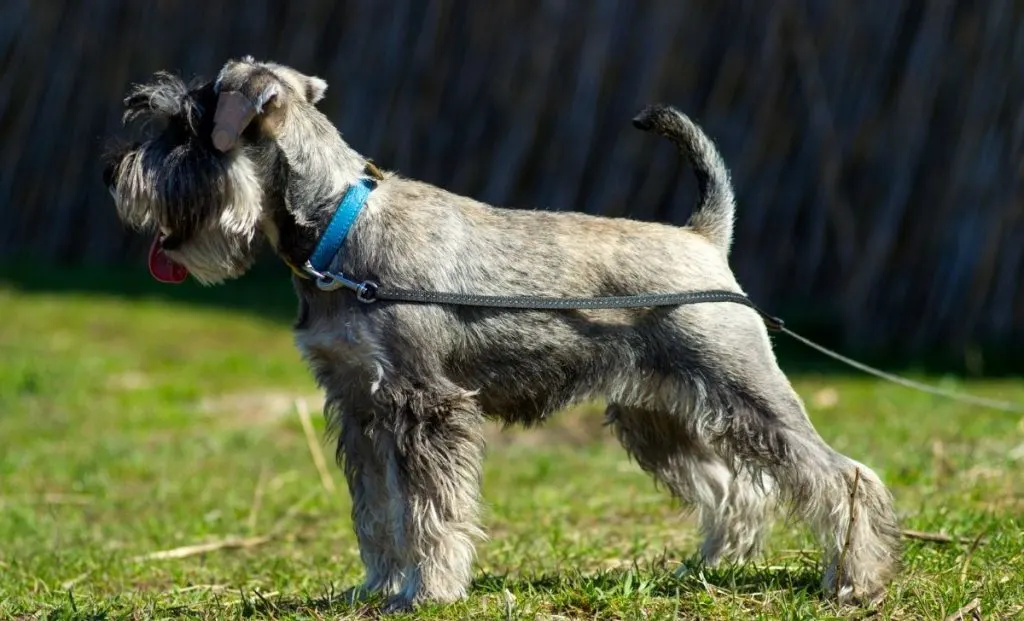If you are thinking about getting this mini pup or maybe you already own one of these little rascals, I am sure that this Miniature Schnauzer feeding chart will be of help.
In order to grow strong and healthy, these small dogs need a balanced diet that is full of essential nutrients that completely fulfill their puppy needs.
Not only can this Miniature Schnauzer feeding guide help you with figuring out how much water or what kind of food your dog needs, but it can also provide more insight in feeding schedules and what not to feed your trusty companion.
Alright, let’s skip the small talk and go straight to business!
Miniature Schnauzer Feeding Chart Overview

Firstly, I would like to break down this feeding chart into a simple table overview based on age, daily feedings, food per day, and type of food.
| Age | Daily Feedings | Food per Day | Type of Food |
|---|---|---|---|
| 8 weeks – 3 months | 3-4 times | 3-4 times 1/4 – 1/2 cup | High-quality wet puppy food |
| 3 – 6 months | 3 times | 1/2 – 3/4 cup | High-quality wet puppy food |
| 6 – 12 months | 2-3 times | 3/4 – 1 cup | High-quality wet puppy food |
| 1 – 7 years | 2 times | 1 – 1.5 cups | High-quality wet puppy food |
| 7+ years | 2 times | 1 – 1.5 cups | High-quality wet puppy food |
As you can see, this is a rough estimation of the food amounts, frequency, and type your Mini Schnauzer needs in order to maintain an ideal weight.
However, these values can significantly vary. You see, the feeding schedule of every individual dog can be very different, which is why we cannot completely stick to one quick feeding chart.
Let’s keep in mind that every dog’s diet is different and each pup needs different foods in order to thrive. Alright, now that we have that clear, we can move on to the next thing.
What Is The Best Food For Miniature Schnauzers?

We all want the very best for our mini puppies, but what do we actually consider as the best?
Well, when it comes to nutrition, the best food for Miniature Schnauzers is the one that contains high-quality ingredients that cater to their specific nutritional needs.
A good and balanced diet for these dogs includes lean meats, whole grains, vegetables, fruits, healthy fats, and additional nutrients.
Protein sources that should be the primary ingredients in both wet and dry dog food are:
- Chicken
- Turkey
- Lamb
- Beef
- Fish
So, what meat is best for a mini Schnauzer? Think lean – boneless chicken and fish. These can be given raw, but there are some precautions with raw ingredients which we will get to later in this article.
When it comes to whole grains, some of the best options are:
- Brown rice
- Oatmeal
- Barley
No matter if it is a giant Schnauzer or a mini one, these important ingredients fulfill their energy needs and provide fiber for their digestive health.
On the other hand, fruits and vegetables are rich in vitamins, minerals, and antioxidants that help support overall health and the immune system. These are also good fiber sources that help maintain healthy digestive systems and regular bowel movements.
- Sweet potatoes
- Pumpkin
- Peas
- Carrots
- Blueberries
- Apples (without seeds or core)
What I would recommend is to always remove pits, seeds, and cores from fruits like apples, peaches, and cherries, as they can pose choking hazards and contain toxins.
Healthy fats, including animal fats such as chicken fat and fish oil, supply essential fatty acids like omega-3 and omega-6, which are very important for skin, coat, and brain health.
Additionally, the diet should include vitamins (A, C, D, E, and B-complex) and essential minerals (calcium, phosphorus, zinc, and iron) to support bone strength and immune function.
It’s important to avoid artificial additives, fillers like corn, wheat, and soy, and by-products, as these can cause allergic reactions and other health issues.
Miniature Schnauzer Puppy Feeding Chart

When they are young, Mini Schnauzer puppies make for the funniest little dogs out there. To be able to maintain their spunky personality, they need to consume the best diet available.
Within the Schnauzer breed, puppyhood is a rather short timespan (12 months) and passes by as fast as you say ”woof”!
So, from the youngest age to the oldest, these little bundles of joy need a variety of foods and a well-balanced feeding schedule.
Let’s start off with the very first week.
Early Nutrition (Birth To 4 Weeks)
Like all small puppies, newborn Mini Schnauzers rely entirely on their mother. The first food they taste is their mother’s colostrum.
This special elixir is full of the good stuff, essential nutrients that help strengthen their immune system and keep them hydrated. In fact, colostrum is so specific, that there is no similar pet food formulation out there. It is one-of-a-kind, puppy milk.
If for some reason, the mother’s milk is not available, a veterinarian-recommended puppy milk replacer should be used.
During the first few days, these little guys are blind and deaf, so you can imagine how much it means having a mother figure to guide them.
However, mother dogs can sense that something is not right and consequently eat their puppies. While it is part of nature, let’s hope that does not happen.
Weaning Process (4 To 10 Weeks)

Let’s move on to the weaning process, which begins around the fourth week and continues until about the tenth week. This is when your Mini Schnauzer puppy gets equipped with needle-sharp teeth, which we call deciduous teeth.
During this period, puppies transition from their mother’s milk to solid food. After all, being high energy dogs, Mini Schnauzers now need more nutrients now than they did before.
Now, this process can vary from puppy to puppy.
Actually, In one of the articles about feeding Corgi puppies, I touched upon a very interesting study that suggests puppies may have individual weaning needs.
So, the best way to figure out when it happens with your dog is to observe them daily. You will realize how adventurous your Mini Schnauzer gets – from nibbling on you to licking everything that is in their vicinity.
As a paw parent, you can help your Mini Schnauzer transition easier by introducing a high-quality puppy food softened with water or a puppy milk replacer to make a gruel-like consistency.
As time goes by, gradually reduce the amount of liquid until the mini puppies are eating dry food.
Between 4 to 6 weeks, offer the puppy much (gruel) around 3 to 4 times a day. Monitor the puppies’ growth and health while adjusting the food amount as needed.
Then, from week 6 to 8, decrease the amount of liquid and offer your pups more solid, high-quality puppy food.
By the end of a 10 week period, puppies should be fully weaned and eating solid puppy food. Continue feeding 3 to 4 times a day.
Puppy Food Stage (3 – 6 Months)
During this stage, Miniature Schnauzer puppies grow rapidly and require a diet rich in proteins, amino acids, vitamins, healthy fats, and other essential nutrients.
Feed a high-quality puppy food formulated for small breeds to support their energy needs and development. The food should be divided into multiple small meals to prevent overloading their small stomachs.
Between 3 to 4 months, you want to feed your Mini Schnauzer 3 times a day, providing around 1/4 to 1/2 cup of food per meal. This amount and feeding schedule will depend on the puppy’s size and activity level.
When your pup reaches 4 to 6 months of age, continue feeding them 3 times a day. However, make sure to adjust the portion size to 1/2 to 3/4 cup per meal as the puppy grows.
Growing Fast (6 – 10 Months)

As Miniature Schnauzer puppies continue to grow, their nutritional needs remain high, but their feeding frequency can be reduced.
This is the period where you have to keep in mind how important it is to monitor the weight of the pups and maintain a balanced diet that supports their bone development, muscle growth, and overall health.
So, between 6 and 8 months it is a good idea to transition to 2 to 3 meals a day. Each meal should consist of 3/4 to 1 cup of high-quality puppy food. needed.
Upon reaching their 10 month birthday, continue feeding 2 to 3 times a day. The portion sizes should still range from 3/4 to 1 cup per meal.
Psst, your Mini Schnauzer is still not done growing! Therefore, make sure the puppy food is still formulated for growth and development.
Nearing Adulthood (10 – 12 Months)
We are almost there! At this stage, Miniature Schnauzers are approaching their adult size and can begin transitioning to adult dog food. However, it’s important to do this gradually to avoid digestive issues.
From my experience, lots of pet owners go through trial and error when choosing the best food for their growing Miniature Schnauzer. Most of us go through different brands like Royal Canin, Hill’s, Acana, etc.
It can take a while until we and our dogs decide to stick to that one diet that is almost perfect. In any case, choose a high-quality adult dog food that meets their nutritional needs.
During such a period, you have to pay attention to how your pups are reacting to the changing food. Watch out for food allergies, gastrointestinal upset (vomiting, diarrhea, constipation, flatulence), and weight management.
Whenever you switch to a new food brand, ensure the transition is gradual. You can do this by mixing the old pet food you used with the new one you want your dog to try out.
Gradually mix adult dog food with puppy food, increasing the amount of adult food over a week.
Feed 2 times a day, with portion sizes adjusted to around 1 to 1.5 cups per day, divided into two meals.
Adult Miniature Schnauzer Feeding Chart

As Miniature Schnauzers transition from puppies to adults, their nutritional needs change.
Typically, an adult Miniature Schnauzer’s diet should consist of high-quality protein sources, healthy fats, and a balance of carbohydrates, vitamins, and minerals.
Feeding your adult Miniature Schnauzer twice a day is ideal, with portion sizes depending on their size, activity level, and metabolism.
So, if you have a super-active mini adult dog, they will require more food than lazy ones (if lazy mini Schnauzers even exist)!
Generally, they need about 1 to 1.5 cups of high-quality dry dog food per day, which is usually split into two meals.
At this age, it is very important to monitor their weight and adjust portions accordingly to avoid obesity, a common issue in this breed.
Therefore, go for high-quality proteins like chicken, turkey, or fish that should be the primary ingredient to support muscle maintenance.
On the other hand, Mini Schnauzers need healthy fatty acids from fish oil and flaxseed oil to keep their skin and coat in tip-top shape.
Some adult Miniature Schnauzers may have specific dietary needs due to allergies or sensitivities, in which case a limited ingredient diet or grain-free formula might be necessary.
Senior Miniature Schnauzer Feeding Chart

Now that your Miniature Schnauzer is entering their golden years, their diet needs another tweak to match their slower metabolism and less active lifestyle.
Like many other old dogs, senior Schnauzers still need a nutrient-dense diet, but with fewer calories to prevent weight gain.
It is a good idea to keep feeding your senior pup twice a day, adjusting portion sizes to around 1 to 1.25 cups of high-quality senior dog food daily, divided into two meals.
Now, feeding them twice a day is usually sufficient, but some owners opt for three smaller meals, especially if the dog has specific health issues like diabetes.
In contrast, larger breeds like Labrador Retrievers, which also have slower metabolisms, typically do well with two larger meals per day.
Senior dog foods often have fewer calories and more fiber to support digestive health, plus extra antioxidants and omega-3 fatty acids to keep those joints moving smoothly and reduce inflammation.
Protein is still important for maintaining muscle mass but opt for easily digestible sources.
Senior Schnauzers might face specific health issues like kidney problems, arthritis, or dental issues. In these cases, special diets may be needed.
For example, a diet lower in phosphorus can help dogs with kidney issues, while foods rich in omega-3 fatty acids are great for joint health.
On the other hand, a high-fat diet can lead to the development of pancreatitis, which is an inflammation of the pancreas and is common in Miniature Schnauzers.
So, I cannot stress enough how important regular vet visits are to help keep an eye on your senior dog’s health and diet.
What Not To Feed A Mini Schnauzer?
Feeding your Miniature Schnauzer the right food is important for keeping them healthy and happy, but it’s just as important to know what not to feed them.
First off, keep your Miniature Schnauzer away from grapes and raisins. These fresh and dried pieces are toxic to canines and can cause kidney failure, even in teeny tiny amounts.
Chocolate is another no-no, as it contains theobromine, which is quite toxic to our canine companions, especially if ingested in large amounts.
Onions and garlic are also off the menu. They can damage your dog’s red blood cells, leading to anemia. Even small amounts of onion powder found in some foods can be harmful.
Avocado might be a superfood for humans, but it’s not for dogs. The fruit, leaves, and bark contain persin, which can cause vomiting and diarrhea in dogs.
Alcohol is a definite no-go as well – even small amounts can be extremely dangerous and lead to intoxication, respiratory failure, or even death.
Be cautious with caffeine, too. This includes coffee, tea, energy drinks, and certain sodas. Caffeine is bad for them (and for us actually) and can cause restlessness, rapid breathing, heart palpitations, and muscle tremors.
Macadamia nuts are surprisingly toxic to dogs. They can cause weakness, depression, vomiting, tremors, and hyperthermia. Other nuts, like walnuts, can also pose a choking hazard and may contain harmful molds.
Bones, especially cooked ones, can be a big danger. They can break or splinter and cause serious blockages or even tears in your dog’s digestive system. Instead, opt for dog-safe chew toys or specially designed dental chews.
Avoid feeding your Mini Schnauzer fatty foods and fried foods. As previously mentioned, these can lead to pancreatitis. It’s also a good idea to skip the table scraps. Not only can they lead to obesity, but they can also cause digestive problems.
Lastly, artificial sweeteners like xylitol, found in many sugar-free gums and candies, are extremely toxic to dogs. These sweets can cause a rapid release of insulin, leading to hypoglycemia (low blood sugar), seizures, and even liver failure.
Sticking to a diet of high-quality dog food and vet-approved treats will keep your Mini Schnauzer healthy and safe.
If you’re ever unsure about a specific food, it’s always best to check with your vet before sharing it with your furry friend.
Healthy Diet, Happy Mini Schnauzer
Using a Miniature Schnauzer feeding chart like this one is very important for not just maintaining their health but also keeping them happy! I mean, who doesn’t do a happy little food dance when eating the good stuff?
From the energetic puppy years to the golden senior days, following a structured feeding chart ensures your Mini Schnauzer gets the right balance of nutrients at the right time.
With a tailored Miniature Schnauzer feeding chart and lots of love, your furry pal will wag their tail with joy every day!

Meet Iram, a devoted veterinarian, passionate dog lover, and current Ph.D. candidate at Utrecht University in the Netherlands. Seamlessly blending her roles as a vet and content writer, Iram channels her love for dogs into heartfelt narratives.
Since childhood, Iram nurtured a dream of becoming a vet, a passion that runs deep in her family. Having now fulfilled that dream, she’s eager to share her acquired knowledge. In her writing, Iram not only explores the emotional bond between humans and their canine friends but also integrates her veterinary expertise, offering readers a holistic understanding of their beloved pets.
